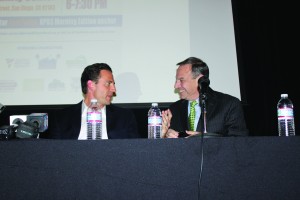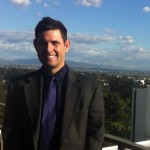
Why I stood up during the debate …
American journalism is sometimes referred to as “The Fourth Estate” – a fourth quasi-branch of government – more specifically, a fourth check-and-balance on the power of our government and elected officials. In fact, the role of the press as defender of freedom is enshrined within the First Amendment to the U.S. Constitution.

But constitutional inclusion comes with special responsibilities. During my 17 years as a journalist, I’ve done my best to abide by three rules. Rule No. 1: Do no harm. Rule No. 2: Get the whole story – and get it ethically. Rule No. 3: Never become the news.
Apparently, I broke Rule No. 3 last week. As San Diego CW 6 television news put it after the LGBT Mayoral Candidates Forum at The Center, “One reporter interrupted the debate to show his displeasure that candidate DeMaio planned to leave early without answering questions.”
After asking an organizer if members of the press should fill out a question card, I was led to believe that reporters would be availed of a question period before the candidates left the stage. I was told that I should NOT fill out a question card. That made sense because it would be unorthodox to ask reporters to fill out audience question cards at a community forum. Restraining reporters from follow-up questions would, at minimum, be outside First Amendment norms.
As the clock ticked on, it became clear to me that something was amiss. When I sought clarification, I was told, there would not be a question period for the media until after the debate – until after the leading mayoral candidate, City Councilman Carl DeMaio, had departed.
Prior to the debate, there had been a lot of speculation about DeMaio planning to leave 15 minutes early, thereby sidestepping media questions that would have been posed while he was on stage before a mostly LGBT audience. In fact, as San Diego LGBT Weekly had reported would happen, it was announced at the start of the debate that the councilman would indeed leave early.
DeMaio ostentatiously ordered an aide, twice, to inform his next engagement he would be 15 minutes late. That was after Assemblyman Nathan Fletcher passionately called DeMaio to account for increasing his chances of obtaining the county Republican Central Committee’s endorsement by lambasting Fletcher for supporting LGBT rights.
With the realization that DeMaio was, whether by design or by default, effectively pulling a fast one on our community – and feeling the weight of my responsibility to act as an agent of the Fourth Estate, i.e., as the questioning voice of our community, I fought my personal fear of embarrassment and rose to ask Mr. DeMaio two questions: First, would he be seeking the endorsement of the Log Cabin Republicans? The LCR rescinded its endorsement of Fletcher who earlier that day had left the GOP. Secondly, did DeMaio regret his campaign’s use of the Assemblyman Fletcher’s support for LGBT equality as a means of winning a party endorsement?
Remember my three rules? Do no harm; get the story ethically; don’t become news. I went back to refresh my understanding of the Society of Professional Journalists’ code of ethics. As far as “doing no harm,” SPJ doesn’t go as far as saying journalists must do no harm. Rather, SPJ instructs us to “minimize harm.”
Regarding “getting the story ethically,” SPJ goes further, saying journalists must not only be ethical. They must also be courageous. From SPJ: “Journalists should be honest, fair and courageous in gathering, reporting and interpreting information.”
As far as not becoming the news, that’s not specifically addressed by SPJ; it’s just something every journalist knows. However, as an aide to a member of Congress told me after the “incident,” if a reporter asking a question is news, then we’ve got a problem in San Diego.
My only regret is that I cowered when I was admonished by a row of DeMaio supporters sitting in front of me to “sit down,” because, as one of them yelled, “No one wants to hear what you have to say.”
Thom Senzee
Editor











